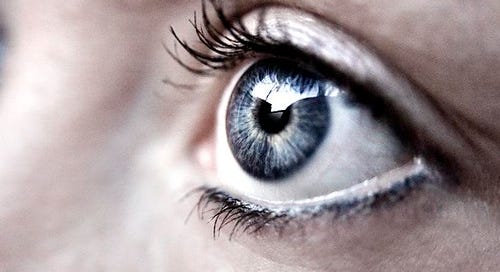Omega-6 Fats (Linoleic Acid) and Blindness
tldr: Is linoleic acid the leading cause of blindness?
(A.S. Linoleic acid is an Ω-6 fatty acid found in vegetable oils like soybean or corn. It is also found in animal fats, but in much smaller amounts, unless the animals are fed soybean or corn. The body seems to expect a certain ratio of Ω-6 to Ω-3 fatty acids (like EPA and DHA), and a certain upper limit on the quantity of Ω-6 fatty acids. When it does not get that ratio, ill health ensues, including cancer, obesity, diabetes, and, apparently, age-related macular degeneration.)
Top 5 Foods For Maintaining 20:20 Vision
…What foods are high in lutein and zeaxanthin?
Here are the top 5 foods with the highest concentrations of these beneficial nutrients:
Kale
Spinach
Peas
Courgette / zucchini
Brussel sprouts
Studies show that 6 mg of lutein and zeaxanthin should be eaten daily as part of your diet to provide the maximum benefit to your macula. (Rose, 2011)
The heck with the veggies:
"Higher intake of specific types of fat—including vegetable, monounsaturated, and polyunsaturated fats and linoleic acid—rather than total fat intake may be associated with a greater risk for advanced AMD. Diets high in omega-3 fatty acids and fish were inversely associated with risk for AMD when intake of linoleic acid was low."
"Dietary Fat and Risk for Advanced Age-Related Macular Degeneration" (Seddon, 2001).
"This study provides evidence of protection against early AMD from regularly eating fish, greater consumption of -3 polyunsaturated fatty acids, and low intakes of foods rich in linoleic acid. Regular consumption of nuts may also reduce AMD risk. Joint effects from multiple factors are suggested."
"Dietary Fatty Acids and the 10-Year Incidence of Age-Related Macular Degeneration" (Tan, 2009).
"Age-related macular degeneration (AMD) is the most common cause of legal blindness of elderly people in the world....
"...In summary, a diet enriched in EPA and DHA can ameliorate the progression of retinal lesions in the Ccl2/Cx3cr1 deficient mice. We suggest that this mouse strain is useful for the screening of therapeutic agents for AMD. One of the mechanisms underlying lower disease progression by long chain n-3 fatty acids may be via a shunted arachidonic acid pathway, leading to an increase of anti-inflammatory derivatives such as PGD2 and decreases of pro-inflammatory derivatives such as PGE2, LTB4, TNF-α, and IL-6. The results in these mice are in line with the epidemiological studies of AMD risk reduction by long chain n-3 fatty acids."
"A High Omega-3 Fatty Acid Diet Reduces Retinal Lesions in a [Mouse] Model of Macular Degeneration" (Tuo, 2009).
So follow the USDA guidelines and go blind. Wonderful.
P.S. More here:
"Linolenic acid (omega-3 fatty acid), which is a type of polyunsaturated fat found primarily in fish and flaxseed oil, is associated with lessening of macular degeneration risk, but only among individuals with lower intake of linoleic acid (omega-6 fatty acid). Therefore, intake of food sources with high linolenic acid (omega-3 fatty acid) and low linoleic acid (omega-6 fatty acid), as is found in Canola oil may help in macular degeneration." (University of Illinois Eye & Ear Infirmary, 2010)
Canola oil is a bad source. Grass-fed beef or butter is a far better source, as it has far less linoleic acid. Good heavens. Taking dietary advice from a medical professional is, on average, a recipe for disaster.
P.P.S. Some possibly contrary information here…
…implying that omega-3 fats are to blame. I posted a comment hoping to reconcile the difference, but Dr. Jaminet did not respond to it.
P.P.P.S. Follow-up here.
Original post February 7, 2011.
References
Rose, D. (2011, February 7). Top 5 Foods For Maintaining 20:20 Vision [Blog]. Summer Tomato. https://summertomato.com/2011/02/07/top-5-foods-for-maintaining-2020-vision/
Seddon, J. M., Rosner, B., Sperduto, R. D., Yannuzzi, L., Haller, J. A., Blair, N. P., & Willett, W. (2001). Dietary Fat and Risk for Advanced Age-Related Macular Degeneration. Archives of Ophthalmology, 119(8), 1191–1199. https://doi.org/10.1001/archopht.119.8.1191
Tan, J. S. L., Wang, J. J., Flood, V., & Mitchell, P. (2009). Dietary Fatty Acids and the 10-Year Incidence of Age-Related Macular Degeneration: The Blue Mountains Eye Study. Archives of Ophthalmology, 127(5), 656–665. https://doi.org/10.1001/archophthalmol.2009.76
Tuo, J., Ross, R. J., Herzlich, A. A., Shen, D., Ding, X., Zhou, M., Coon, S. L., Hussein, N., Salem, N., & Chan, C.-C. (2009). A High Omega-3 Fatty Acid Diet Reduces Retinal Lesions in a Murine Model of Macular Degeneration. The American Journal of Pathology, 175(2), 799–807. https://doi.org/10.2353/ajpath.2009.090089
University of Illinois Eye & Ear Infirmary. (2010, November 16). Macular Degeneration Types and Risk Factors [Advertisement]. Eye Digest. https://web.archive.org/web/20101116110733/http://www.agingeye.net/maculardegen/maculardegeninformation.php






"low intakes of foods rich in linoleic acid...[and] Regular consumption of nuts may also reduce AMD risk."
It baffles me whenever these two suggestions are placed right next to each other with zero apparent awareness of the contradiction. Seems to happen quite a bit.
It is cool that AMD is one of the few instances where average people are willing to admit the link between omega-6 and bad outcomes. Of course there's still a bunch of hopeful quibbling trying to coax omega-3 into being the get-out-of-jail-free card, but acknowledging the omega-6 at all is a nice start.
Hi, this is interesting information, thank you; I am wondering if I should eat more of those foods since I primarily eat beef? Thank you for your thoughts